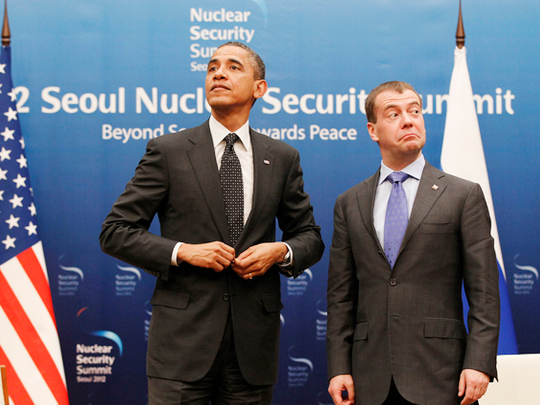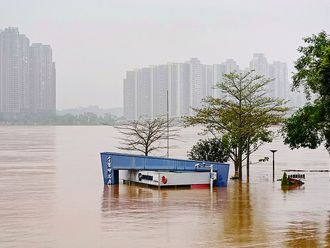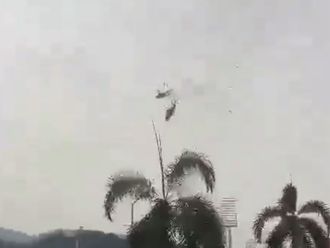
Seoul: North Korea vowed on Tuesday to go ahead with a rocket launch, snubbing demands from US President Barack Obama and other world leaders who are in Seoul for a summit on combating nuclear terrorism.
The North's plan to launch a long-range rocket next month has overshadowed the 53-nation summit, which is meant to focus on the threat of uranium and other nuclear material from falling into the hands of terrorists.
Obama has devoted much of his three-day South Korean visit to its wayward neighbour, repeatedly denouncing the rocket launch while emphasising the United States is not hostile to the North's people.
North Korea responded Tuesday by saying it would go ahead with what it calls a peaceful satellite launch, saying every nation has this right, and called on Obama to drop his "confrontational mindset".
"The US head of state said he had no hostile intention towards us," said a Pyongyang foreign ministry spokesman quoted by the official KCNA news agency.
"But if that remark is genuine, he should abandon the confrontational mindset that tries to block us, and should have the courage to admit that we have as much right to launch our satellite as other countries do."
The North said it would judge whether Obama's remarks were genuine "or just another hypocrisy" depending on whether his country applies a double standard to the launch.
The United States, Japan, South Korea and other countries say the launch would in fact be a long-range missile test, banned under UN resolutions and breaching US-North Korean deal last month.
Obama on Monday made an unusual, direct appeal to the North's new leaders to "have the courage to pursue peace". There would be no more rewards for provocations, he said in reference to its launch.
Chinese President Hu Jintao, whose country is North Korea's sole major ally, also reportedly expressed serious concern at Pyongyang's plan during a meeting Monday with Obama.
On Tuesday's second and final day of the summit, Obama was focused on the nuclear threat from "non-state actors" and not the nuclear-armed North.
"The security of the world depends on the actions that we take," he said in a speech to delegates at the start of the day.
Obama in 2009 declared his vision of a world without nuclear weapons and the following year hosted a Washington summit, aimed at securing or destroying the world's stocks of plutonium and highly enriched uranium (HEU) by 2014.
"We are fulfilling the commitments we made in Washington. As a result, more of the world's nuclear material will never fall into the hands of terrorists who would gladly use it against us," Obama said.
"What's also undeniable is that the threat remains. There are still too many bad actors in search of these dangerous materials and these dangerous materials are still vulnerable in too many places.
"It would not take much - just a handful of so of these materials - to kill hundreds of thousands of innocent people."
But as a consequence of the Seoul summit, "more of our citizens will be safer from the danger of nuclear terrorism", Obama declared.
Highlighting the threat, an Interpol representative told the session there was "lots of evidence" that Al Qaida would use nuclear weapons if it had them, according to German delegation sources.
Interpol said there were 3,000 cases in 119 countries in which nuclear material had gone missing.
China's Hu, in his opening speech, noted good progress since 2010 but said the situation "remains grave".
He said his country would deepen cooperation with UN nuclear watchdog the International Atomic Energy Agency and help countries that want to convert reactors from HEU fuel to low enriched uranium.
Summit host, South Korean President Lee Myung-Bak, said the proliferation of nuclear weapons and the threat of nuclear terrorism "pose a grave challenge" to peace.
The world still has some 1,600 tons of HEU and 500 tons of plutonium - enough to make more than 100,000 nuclear weapons, Lee said, calling for firm commitments to action.
Leaders were also tackling the threat posed by loosely-guarded radioactive material in hospitals and other sites, which could be combined with high explosives to make a "dirty bomb".
Late Monday France, Belgium, and the Netherlands - three of the world's top suppliers of medical isotopes - announced plans eventually to phase out the use of HEU in the production process, under a deal with the United States.
Obama says he’s not ‘hiding the ball’
Obama said he is not trying to "hide the ball" in negotiations with Russia over US plans for a missile defence shield in Europe, trying to put to rest a controversy over comments to Russia's leader that were picked up by an open microphone and quickly drew fire from Republican presidential contenders in America.
Republicans had pounced on Obama's remarks to Russian President Dmitry Medvedev on Monday that he would have more room to negotiate on the issue after the November presidential election, accusing the president of having a hidden agenda that could include concessions to the Russians if he is re-elected this fall.
Obama's conversation was picked up by a microphone without either leader apparently knowing.
"This is my last election," Obama was heard telling Medvedev, Russia's outgoing president. "After my election, I have more flexibility."
A day later, with election-year political machinery in full gear, Obama sought to clarify.
"I want to reduce our nuclear stockpiles. And one of the barriers to doing that is building trust and cooperation around missile defense issues," he said while he and Medvedev made a separate announcement about nuclear materials cleanup on the sidelines of a major security conference here.
"And so this is not a matter of hiding the ball," Obama said. "I'm on record."
Obama was prepared and eager to clarify his caught-on-tape words even at the risk of overshadowing his message for a second day about nuclear security efforts. In talking to reporters, however, he never answered a question about the presumptuousness of plotting out 2013 strategy with Russia when, in fact, he must win election again for any of that to matter.
For Russia, the issues of nuclear weapons reduction and the proposed missile shield are related. Russian fears of new U.S. missiles at its doorstep in Europe have helped to stymie further progress on nuclear arms reductions after a breakthrough agreement two years ago.
Obama said he wants to spend the rest of this year working through technical issues with the Russians, and said it was not surprising that a deal couldn't be completed quickly.
"I don't think it's any surprise that you can't start that a few months before presidential and congressional elections in the United States, and at a time when they just completed elections in Russia, and they're in the process of a presidential transition," Obama told reporters Tuesday.
He also made light of the controversy, jokingly asking whether the microphones were switched on before he spoke.
"The only way I get this stuff done is if I'm consulting with the Pentagon, if I'm consulting with Congress, if I've got bipartisan support, and the current environment is not conducive to those kinds of thoughtful consultations," Obama said. "I think we'll do better in 2013."
Neither Obama nor Medvedev knew they were being heard when they conferred quietly at what was billed as their last meeting of Medvedev's presidency. He leaves office in May, to be replaced by the incoming Vladimir Putin.
According to ABC News, Medvedev replied in English: "I understand. I will transmit this information to Vladimir," an apparent reference to incoming President Vladmir Putin.
The White House said Obama's words reflected the reality that domestic political concerns in both the US and Russia this year would make it difficult to fully address their long-standing differences over the contentious issue of missile defense. Obama, should he win re-election, would not have to face voters again.
Obama's candid remarks Monday illustrated the political constraints that hem in any president who is running for re-election and dealing with a congressional chamber - in this case, the House - controlled by the rival party.
Republicans have fought Obama fiercely on health care, taxes and other issues. They are eager to deny him any political victories in a season in which they feel the White House is within reach, although Obama's remarks suggested he feels good about his re-election prospects.
Mitt Romney, the leading Republican contender to face Obama this fall, told a San Diego audience the unguarded comments were "an alarming and troubling development."
"This is no time for our president to be pulling his punches with the American people, and not telling us what he's intending to do with regards to our missile defense system, with regards to our military might and with regards to our commitment to Israel," Romney said.
Romney, a former Massachusetts governor who often faces charges of having been flexible on his own policies over the years, also issued a statement saying Obama "needs to level with the American public about his real agenda."
Obama campaign spokesman Ben LaBolt said Romney "is undermining his credibility by distorting the president's words."
Republican presidential candidate Newt Gingrich also questioned Obama's motives.
"I'm curious, how many other countries has the president promised that he'd have a lot more flexibility the morning he doesn't have to answer to the American people?" Gingrich said on CNN.
Representative Mike Turner of Ohio, Republican chairman of the House Armed Services Subcommittee on Strategic Forces, wrote to the president requesting an "urgent explanation of (his) comments." Turner said Congress "has made exquisitely clear to your administration and to other nations that it will block all attempts to weaken US missile defenses."
The Republicans' sharp remarks underscore increased willingness of politicians to criticize a president on a foreign trip. The old adage "politics ends at the water's edge" is a casualty of the nation's heightened partisanship in recent decades.
Obama said the way the Republicans seized on his open-mic comments only made his point that the atmosphere is too politicized right now to advance arms control with Russia.
Congress, as part of the fiscal 2012 defense authorisation act, constrained Obama's ability to share classified US missile defense information with Russia. Obama signed that legislation into law.
Putin said earlier this month that Washington's refusal to offer Moscow written guarantees that its missile defense system would not be aimed against Russia deepened its concerns.












